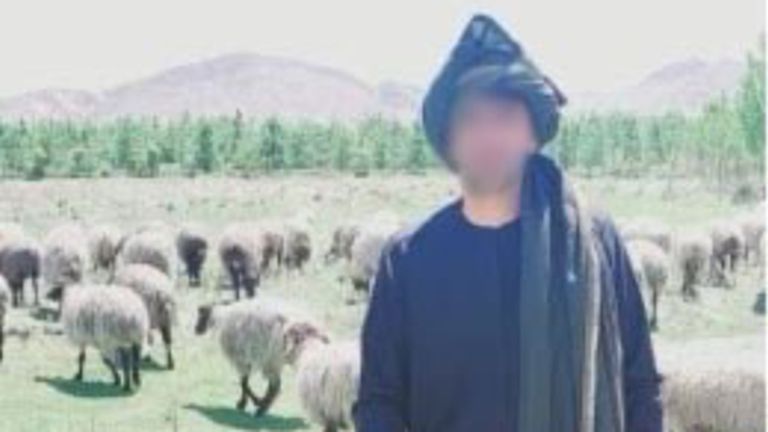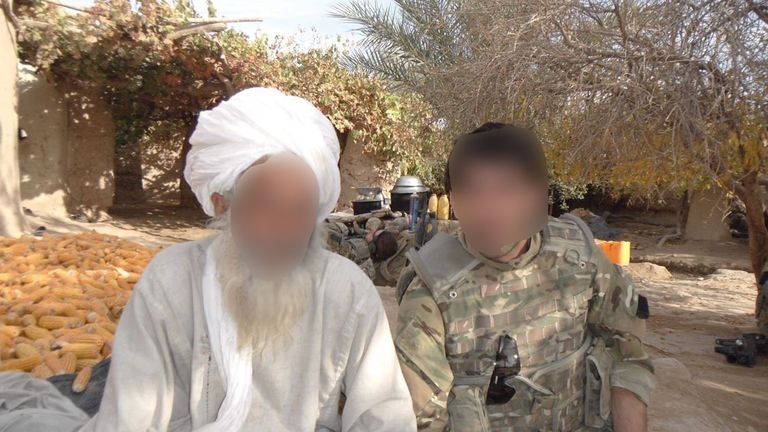[ad_1]
A group of former British soldiers have met the Afghan interpreter they worked with after helping him flee the country.
The interpreter said the Home Office twice refused him entry to the UK because he was a danger to “national security” and because his “presence in the UK would not be conducive to the public good”.
Former soldiers Joshua Roberts, Vance Bacon-Sharratt, Paul Standen and Sam Knight worked with lawyers and the British government to get their ex-colleague’s visa approved.
“We all go through minor language courses to pick up certain words and phrases to get by, but without an interpreter you wouldn’t be able to get by, you wouldn’t be able to meet with the local populace,” Mr Roberts said.
“We embedded with one another. We took on parts of his culture and he took on parts of ours, and we all worked as a team.
“There was a time when we were caught in a major contact with an enemy force and a civilian got caught between us and the interpreter cleared him straight away. That could’ve ended catastrophically.”
Mr Bacon-Sharratt said: “Interpreters are massively important. The amount of times he’s told us the Taliban have spotted us, they know our location, they’re gonna fire on us.
“We didn’t take a fatality because of him. He’s saved lives.”
Mr Roberts said it was shocking to watch events unfold in Afghanistan last summer, when the Taliban regained control of the country as British and US forces made a sudden and chaotic withdrawal.
“It almost felt like it was all for nothing,” he said. “We felt it was heavily rushed, and it ended in a way it shouldn’t have. There should’ve been a much longer pull out with more overwatch on the situation.”
Read more:
Everything you need to know about the Taliban takeover
‘Serious failures’ of Afghanistan evacuation lowered UK’s reputation
‘I only had contact with these guys’
As UK troops left Afghanistan, many of the local “assets” who had worked alongside the foreign armies were left behind, fearing for their lives under Taliban rule.
The interpreter Mr Roberts and his fellow soldiers helped escape had spent six months living apart from his family, hiding in a friend’s basement, while he waited for his UK visa to be issued.
“I didn’t know who will help me, how to contact the government,” the interpreter told Sky News as he sat down with the soldiers who helped him escape.
“When I was stuck there, when I was in trouble, I only had contact with these guys.
“I didn’t have any way to contact the UK government or any MPs or solicitors.
“These guys helped to finally get me out.”
Read more:
What’s life like under the Taliban?
‘False promises’ as Home Office leaves Afghans in limbo
‘A monumental task’
“Paul and Sam were on it straight away,” Mr Roberts added. “They got in contact with our interpreter to see where we could go from there.
“It took a significant amount of involvement from us four, yourself and other news outlets, family members and solicitors; complete strangers coming together.
“I think it’s a very complex process. I imagine if we had more leverage in other places like in government it would’ve been easier. But for a bunch of four infantry lads from the Midlands, it was quite a monumental task.”
Fifteen thousand people were evacuated from Kabul during Operation Pitting last summer, and the UK government says it continues to do all it can to secure safe passage and enable British nationals and eligible Afghans to leave the country.
A government spokesperson said: “We continue to progress applications as quickly as possible, recognising processing time can vary given the complexities of individual circumstances such as location, access to IT, employment history, security checks or family circumstances.”
[ad_2]



